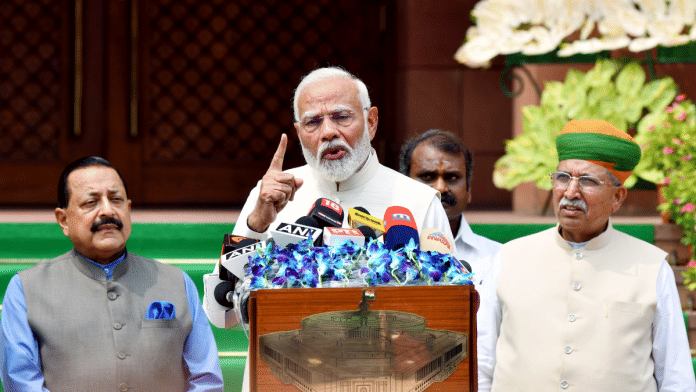The agenda that Prime Minister Narendra Modi advocated at the 23rd Shanghai Cooperation Organisation summit in 2023 will continue to guide him at the 24thsummit this year. Two aspects of India’s outlook toward a global cooperative framework were prioritised in last year’s statement at the SCO summit. One wasVasudhaiva Kutmbakam, or ‘the world is one family’, which formed the bedrock of the G20 Summit presided over by India. The other was SECURE, which stood for Security, Economic development, Connectivity, Unity, Respect for sovereignty and territorial integrity, and Environmental protection. It was this vision that set the tone and tenor of the 24thsummit, which the PM did not attend in person. The Indian delegation was led by External Affairs Minister S Jaishankar.
Founded in 1996, the Shanghai Five metamorphosed into the SCO in 2001 — a Eurasian multidimensional organisation launched by two leading countries of the Communist bloc, China and Russia. AtAstana in Kazakhstan in 2017, India and Pakistan were admitted as members. While Russia advocated for India’s membership, China insisted on Pakistan being given the same status and hyphenated the two countries, much to the disapprobation of New Delhi. In the case of Nuclear Suppliers Group (NSG) also, China insisted on giving simultaneous entry to India and Pakistan, just as it had done in the case of BRICS (Brazil Russia India China South Africa).
China had even “advised” India and Pakistan to “strictly follow the charter of the SCO and the idea of good neighbourliness, uphold the SCO spirit, improve their relations, and inject new impetus to the development of the SCO”. Russia realised the potential of extending the Eurasian forum beyond Central Asia to South Asia, with India as a strong economic fulcrum.
While China is clearly uncomfortable with Russia according importance to India in its economic and geopolitical policies toward South Asia and Central Asia, once considered part of a larger area of influence of the erstwhile Soviet Russia, the West is uncomfortable with India’s proximity to Moscow, especially in the background of the ongoing Russia-Ukraine conflict.
India’s emphasis on improving trade and economic relations with Russia has not gone down well with the West, which would like New Delhi to distance itself with any multilateral outfit of which Russia is a part. But this does not appear to be a reason for the PM skipping the SCO summit. India has been maintaining a steady balance between the adversaries — United States and Russia — and close relationship with Moscow without compromising its position on the ongoing conflict. On its part, Russia has genuine reasons to be worried about the implications of China’s increasing influence in South Asia, Central Asia, and India’s extended neighbourhood. For Moscow, one way of limiting Beijing’s clout in the SCO is to bring in India and counter-balance Chinese influence in the decision-making process.
Also Read: PM’s 100-day agenda may have to jettison core issues for coalition partners
Boosting India-Russia camaraderie
During his 2017 visit to Moscow, PM Modi had stated that “India, Russia friendship is very old, deep and based on trust. India and Russia have always been together on international issues,” thus reiterating India’s resolve to be on the right side of Moscow in international issues, bilateral relationships, and trade. His proposed visit to Russia sometime next week to meet President Vladimir Putin is likely to cement the camaraderie between the ‘two old friends’ further. It is, therefore, clear that the West, especially the US, has no influence on India’s decision to scale down the importance of the SCO at a time when China appears to have been successful in creating a perception of its supremacy over the affairs of the summit. One cannot deny the fact that many SCO members could actually be feeling uncomfortable by the economic and military asymmetry between them and China.
Considering the weight behind the feeling of this asymmetry, both India and Russia will also have to reset their priorities and strategies as far as South Asia and Central Asia are concerned, as many countries in this strategic zone would like to chart an independent course when China assumes the chairmanship of SCO in 2025. While India is playing a seminal role in the Indo-Pacific and its economic architecture, Central Asian economies would want to hold India’s apron string to deal profitably with the Indo-Pacific and the Indo-Pacific Economic Framework (IPEF). For New Delhi, Central Asia has greater importance for not only reviving the cultural ties but also economic ties and use it as a bridge for reaching out to West Asia and Europe. With India on their side, Central Asian economies will have the comfort of being members of the SCO without attracting the tag of being pro-Beijing or anti-West.
In all, SCO’s 24th summit and PM’s proposed Moscow visit are expected to be turning points in the geopolitics of Asia and Eurasia.
Seshadri Chari is the former editor of ‘Organiser’. He tweets @seshadrichari. Views are personal.
(Edited by Humra Laeeq)







The name, Shanghai Cooperation Organisation, itself shows where the locus of influence lies. These four CAR were originally part of the Soviet Union. Have retained security relationships with Russia. However, they do a lot of trade with China, an immense market for their hydrocarbons and natural resources. Deeply landlocked, happy to see the connectivity that BRI and other initiatives create. To be honest, India cannot compete with China within the SCO. 2. When India and Pakistan were invited to join SCO, with Russia playing a role, it was conveyed to them that this was not a forum for them to air their bilateral differences. Unfortunately, that situation has raised between India and China as well. We can either use the forum to deepen our economic engagement with CAR, leaving our issues with China and Pakistan to one side, or face a situation when it becomes awkward to attend summits.